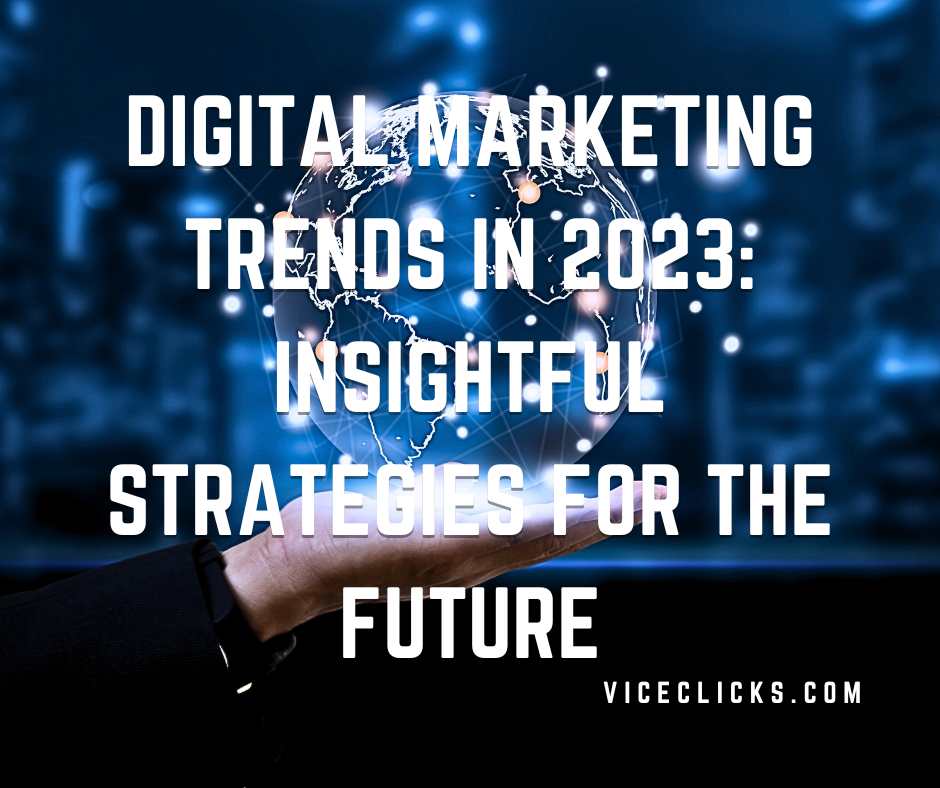Digital Marketing Trends in 2023: Insightful Strat …

In the dynamic landscape of digital marketing, staying ahead of the curve is crucial to achieve success. The year 2023 brings forth a new set of trends and strategies that are poised to reshape the way businesses approach their marketing efforts. From artificial intelligence (AI) advancements to heightened customer expectations, let’s dive into the key digital marketing trends that will define this year and beyond.
1. AI-Powered Personalization: Enhancing Customer Experience
As we step into 2023, personalization continues to be a paramount aspect of successful digital marketing. However, what sets this year apart is the integration of artificial intelligence into personalization strategies. AI-driven algorithms analyze vast amounts of data to understand customer behaviors and preferences, enabling marketers to create hyper-targeted content and experiences. From product recommendations to tailored email campaigns, AI-powered personalization enhances customer engagement and fosters brand loyalty.
2. Video Dominance: Captivating Audiences
Videos have solidified their position as a cornerstone of digital marketing. In 2023, the dominance of video content remains unchallenged, with platforms like TikTok, YouTube, and Instagram Reels driving engagement. Short-form videos are particularly effective in conveying messages quickly and creatively, catering to audiences with shrinking attention spans. Brands are capitalizing on this trend by crafting visually appealing videos that resonate with their target demographics.
3. Social Commerce: Seamless Shopping Experience
The fusion of social media and e-commerce, known as social commerce, is gaining significant traction in 2023. Platforms are evolving from mere advertising spaces to interactive shopping destinations. Social media giants are incorporating features that allow users to explore, select, and purchase products without leaving the app. This streamlined shopping experience blurs the lines between discovery and purchase, making it easier for brands to convert leads into loyal customers.
4. Ephemeral Content: FOMO-Driven Marketing
The ephemeral nature of content on platforms like Snapchat and Instagram Stories has given rise to a new marketing strategy: FOMO-driven (Fear Of Missing Out) marketing. Marketers are leveraging the temporary nature of these posts to create a sense of urgency and exclusivity. By offering limited-time promotions or sneak peeks, brands encourage immediate engagement and conversions, capitalizing on consumers’ fear of missing out on unique opportunities.
5. Sustainability and Social Responsibility: Ethical Branding
In an era of heightened social and environmental awareness, consumers are gravitating toward brands that align with their values. Sustainability and social responsibility have transitioned from being optional add-ons to integral components of a brand’s identity. Digital marketing in 2023 emphasizes transparent communication about eco-friendly practices, ethical sourcing, and community involvement. Brands that genuinely embrace these values stand to establish deeper connections with their audience.
6. Voice Search Optimization: Conversational SEO
Voice search is revolutionizing the way people interact with technology. With the proliferation of voice-activated devices like smart speakers and virtual assistants, optimizing for voice search is no longer a luxury—it’s a necessity. Marketers need to adapt their SEO strategies to accommodate conversational queries, focusing on natural language and long-tail keywords. Brands that excel in voice search optimization will be more discoverable in a world where voice commands play a pivotal role.
7. Augmented Reality (AR) Experiences: Immersive Engagement
2023 is witnessing the integration of augmented reality into digital marketing strategies. AR enables brands to offer immersive experiences, allowing customers to interact with products and services in virtual spaces. From trying on virtual clothes to visualizing furniture in their homes, AR bridges the gap between online and offline experiences. This trend not only enhances customer engagement but also empowers consumers to make more informed purchasing decisions.
8. Data Privacy and Personal Data Protection: Building Trust
The ongoing concern for data privacy and personal data protection continues to shape digital marketing trends in 2023. With the implementation of regulations like GDPR and CCPA, consumers are more conscious of how their data is being used. Brands that prioritize transparent data collection and adhere to strict privacy standards build trust with their audience. Consent-driven marketing strategies are becoming imperative, ensuring that customers have control over the data they share.
9. Interactive Content: Driving Active Participation
Interactivity is becoming a driving force in digital marketing, enabling brands to foster deeper engagement with their audience. Quizzes, polls, interactive infographics, and live streams encourage active participation and create memorable experiences. This trend is especially effective in capturing and retaining the attention of younger generations who value two-way communication with brands.
10. Predictive Analytics: Anticipating Consumer Behavior
Predictive analytics, fueled by AI and machine learning, is a game-changer for digital marketers in 2023. By analyzing historical data and identifying patterns, brands can anticipate consumer behavior and tailor their strategies accordingly. This proactive approach enables marketers to optimize campaigns, refine targeting, and stay ahead in an ever-evolving market.
In conclusion, the digital marketing landscape in 2023 is characterized by cutting-edge technologies, evolving consumer behaviors, and a heightened emphasis on ethical practices. Embracing AI-driven personalization, harnessing the power of videos, leveraging social commerce, and staying attuned to sustainability concerns are just a few of the strategies that will shape successful marketing campaigns. As ViceClicks adapt to these trends, they will position themselves to effectively navigate the digital landscape and connect with their target audience in meaningful ways.
